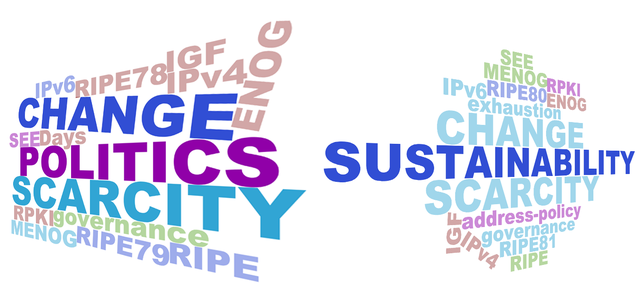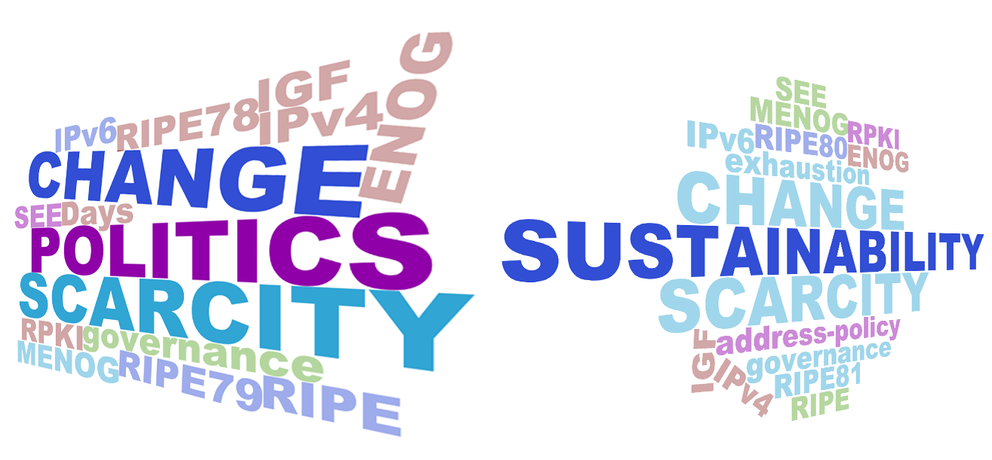A look back at the RIPE NCC's year that was and to the year ahead.
I know what you’re thinking: "is he really so cheesy and predictable that he’d exploit an arbitrary point on the Earth’s orbit around the Sun to look back at the professional events of the previous orbit?!"
Yes. Yes, I am.
And cheese aside, 2019 was a momentous year for the RIPE NCC - a year of milestones and landmark events, all of which add up to what is sure to be a very interesting 2020 (and beyond). So from nothing more than my personal perspective, and with the dual hats of historian and prophet firmly in place, let’s dive in!
2019 in Three Words
In the great RIPE NCC word cloud of 2019, three words stand out: scarcity, change, and politics. So let’s start with those...
Scarcity
Number resource administration has always dealt with scarcity in various forms, whether it’s the scarcity of the IP address pool or the computing power required to enable routing. In 2019 though, scarcity suddenly became a very pressing concern, with the final exhaustion of the RIPE NCC’s pool of available IPv4 addresses.
While long predicted and prepared for, the effects of this development throughout 2019 were still significant. For the RIPE NCC, that meant increased pressure on our services, as record numbers of organisations sought to open LIR accounts and obtain a /22 block from the remaining pool. And as the number of IPv4 transfers continued to increase, it also meant an increased need for due diligence and scrutiny on the part of the RIPE NCC, a development that not everyone in the community at first welcomed.
Taking a step back, it’s easy to see that scarcity changes the dynamics of our ecosystem. It creates or strengthens a whole set of incentives and tendencies that the registry system was not originally designed to manage - the incentive to regard IP addresses as assets (and in the case of some governments, sovereign assets), leading some people to try to obtain or hijack IP addresses by whatever means necessary. This change might have been a long-approaching wave, but in 2019, that wave crashed over the RIPE NCC. This brings us to our second word:
Change
The Internet moves quickly (and occasionally breaks things!), but Internet administration, particularly in the number space, moves more deliberately. The RIR communities’ policy development processes, while responsive to developments in the industry and community, are actually quite conservative in how they manage change, and the RIRs themselves are, in general, also quite conservative (something many see as a feature!).
The pace of change in 2019 has not been conservative. With the exhaustion of the IPv4 address pool, the RIPE NCC enters a new business reality, no longer defined by the dizzying growth in membership numbers, but in which the role of an accurate, reliable registry may be more important than ever. Meanwhile, the community continues to change, with calls for an evolution of the RIPE Database and the RIPE Policy Development Process itself growing louder and more insistent.
Not least amongst the year’s changes was the departure of the organisation’s Managing Director of 20 years, Axel Pawlik. For many people, both staff and community, this symbolised the end of an era – and the beginning of a new one.
While all of this was happening, though, some of the most profound changes and developments relating to the Internet were taking place well away from technical discussions, and instead in the field of:
Politics
At this point, it sounds like a broken record, but governments are taking an ever more active interest in the Internet and how it is managed. That trend was clearly on display in 2019, with a raft of new legislation and regulation agreed upon, coming into effect or beginning to affect how Internet operators do business.
In the RIPE NCC service region alone, the Russian Sovereign Internet law came into effect; Belarus became the first country in the world to legally mandate support for IPv6; implementation of the European Union’s Network and Information Systems (NIS) Directive continued across the member states (including the Netherlands, where the RIPE NCC is headquartered); and the increasing use of sanctions targeting countries and specific organisations threatened a “business as usual” approach in the internationally-oriented Internet industry (including for the RIPE NCC itself).
Many more governments, meanwhile, are actively looking at what regulatory or legislative moves they could make to secure more control and autonomy over what are increasingly seen as “national resources” (often including Internet number resources), and this is fueling much of the discussion in venues such as the International Telecommunication Union (ITU).
At the global level, there was positive news for supporters of a multistakeholder approach, with the largest ever Internet Governance Forum (IGF), a new Chair for the IGF’s Multistakeholder Advisory Group, and support for continuing evolution of this platform by an expert international panel convened by the UN Secretary General. At the same time, however, the year closed out with agreement in the UN’s General Assembly to move forward with plans to establish an Open-Ended ad-hoc Committee of Experts (OECE) to begin drafting an international Cybercrime Convention. The extent to which that process will be “multistakeholder” is unclear, but the early signs are not promising.

2020 in One Word
So, onto the brave new year…
The first point, of course, is that none of those three themes from 2019 are going away any time soon. The scarcity of the IPv4 resources will continue to bite in 2020, driving policy, processes, and regulation. There’s plenty of change still ahead, including the appointment of a new RIPE NCC Managing Director and the adjustment of both the RIPE NCC and our community to the realities of post-IPv4 exhaustion. And the politics surrounding all of this are only likely to grow more intense, driven by sovereignty issues, security concerns, geopolitical instability, and the desire of governments to have their countries keep up as the Internet grows ever more integral to society.
So…one word, here it goes:
Sustainability
While the Earth is apparently on fire or flooding (and I fully expect to see more environmentally themed proposals reaching the various RIPE community programme committees over the coming 12 months!), I’m using the term in a much more general sense. The idea of sustainability can (and will need to) help frame the challenges that have grown throughout 2019, the potential solutions, and the vision of where exactly we want to end up.
Do we (as the Internet community) have the resources and tools to sustain the Internet growth that’s still needed to connect everyone (and everything) that needs connecting? The vast address space of IPv6 is an obvious (and hopefully) sustainable solution to the scarcity created by IPv4 exhaustion. Highlighting to all stakeholders the importance of IPv6 adoption, facilitating the sharing of best practices or successful strategies, and educating network operators on IPv6 deployment through face-to-face training and online tools (including the new RIPE NCC Certified Professionals programme) will undoubtedly be priorities for the RIPE NCC in 2020.
As we manage the ongoing changes affecting the RIPE NCC, it will be vital to build sustainability into the new models and approaches we develop and define. That will mean the financial sustainability of the organisation itself, as membership growth begins to flatten (or decline) and membership incentives change. And it will mean sustaining the legitimacy and authority of the RIPE registry, and the RIPE NCC as steward and operator of that registry.
Likewise, the RIPE community will need to focus on the sustainability of its own authority and legitimacy. This has already begun through work on the RIPE Database and its purpose, following up on RIPE community accountability, and building on diversity and inclusiveness of the community. The fact that evolution may be necessary is no surprise, nor is it unusual for RIPE - the community has long prided itself on being able to respond dynamically to changes in a fast-moving industry. But clearly identifying and understanding which elements of the RIPE approach are of value and should be retained as RIPE evolves is a significant task.
Finally, as we look to the political scene, the need to find a sustainable role and approach for governments (either within their own territories, or collectively through institutions like the United Nations) is a pressing issue, with the potential to significantly impact how Internet policy is made, the structures through which Internet administration is carried out, and the future development of the Internet itself. For the RIPE NCC, this reinforces the importance of our efforts to engage with governments, understand their concerns and foster their inclusion in the RIPE community. For the RIPE community, it will mean continuing to work on what role governments and their representatives have in the RIPE community and its processes, particularly policy development.
In the end, a sustainable administrative approach has always been at the heart of why the RIRs (and the RIPE community itself) exist - an approach to governance that could weather the rapid changes in the industry it serves while providing an essential element to the interoperability and cooperation that are fundamental to the Internet’s success. As we move into 2020, the word has taken on a much broader and more urgent meaning in our society - hopefully, the RIPE NCC and the RIPE community can help lead and set an example of what sustainable practices can look like.





Comments 0
The comments section is closed for articles published more than a year ago. If you'd like to inform us of any issues, please contact us.